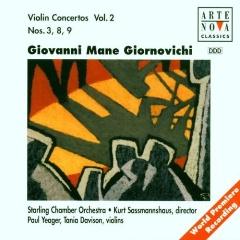Ivan Mane Jarnović (Giovanni Mane Giornovichi) - Violin Concertos Vol. 2 (2000)
Ivan Mane Jarnović (Giovanni Mane Giornovichi) - Violin Concertos Vol. 2 (2000)

Violin Concerto No. 3 in G major 1 Allegro 10:41 2 Adagio 6:07 3 Rondo: Allegro 6:06 Violin Concerto No. 8 in B flat major 4 Allegro 12:04 5 Adagio-Romance 6:59 6 Rondo 3:47 Violin Concerto No. 9 in G major 7 Allegro 11:55 8 Largo 9:00 9 Rondo: Allegro 7:24 Paul Yeager – violin (1-3, 7-9) Tanis Davison – violin (4-6) Starling Chamber Orchestra Kurt Sassmannshaus – conductor
A man named Jarnovic - or Giornovichi (in fact his name occurs in no less than 46 different spellings!) - was the reason for a most extraordinary journey, a kind of a pilgrimage, to the city where he had died 200 years previously. He was not a native of St Petersburg; he himself had journeyed much; and yet in some senses there could be no more appropriate resting place for one who, like that city, stood at a kind of a threshold in the eighteenth century, mediating the old and the new, the musical influences of eastern and western Europe, the Baroque and the ‘Modern’ style of the Classical-Romantic era. As violinist and composer, his art and virtuosity moved the general populous as it did kings - the Polish Prince Oginski, who took lessons from Jarnovic, told how listeners would fall into “a collective trance, very often followed by tears”, so exceptional was his playing. He himself was of most humble birth, and literate to a point only; he was, by legend, born at sea (baptized at Palermo); and, seemingly, he recognized no nationality as his own; no king, nor empress: he was, one could say, a citizen of the world. With Oscar Wilde he might well have quipped, at the frontiers, that he’d nothing to declare - except his genius!
The passionate artist charmed his patrons, but he could, by all accounts, quarrel with them also, leaving a trail, on more than a few occasions, of soured relations. He lived life to the full, spending as he earned. (Oginsky, again, relates how one night in Warsaw in 1782 he gambled away 2000 gold pieces - an amount equivalent to what the Polish king spent to maintain his 30-member orchestra for an entire year!). Such exploits fuelled writings of the 1840s that painted Jarnovic in the guise, perhaps anachronistically, of the rebellious, eccentric Romantic; and, as virtuoso, a precursor to the likes of Paganini (parallels between these two performers included a fatal attraction for gambling!). In the wake of this literature, full of embellishments, it has become difficult to separate fact from fiction. Whole periods of his life - his youth and other interludes - remain essentially unaccounted for, while details as to his origins and identity have proven to be remarkably elusive
Jarnovic died, it is said, a total pauper; yet he was given a king’s send-off (at his funeral, friends performed the Kozlowski Requiem Mass that was composed for the funeral of the exiled Polish King Stanislaw II in 1798, and which was next heard at the laying to rest of Tsar Alexander I in 1825). “An esteemed local dilettante assumed the costs so that his funeral might be appropriately observed. A large orchestra of local musicians, to which Madame Mara lent the splendour of her song, played solemn funeral music.”
For a century Jarnovic was all but forgotten: eclipsed in popularity as musical fashions changed, and then cast in the role of forerunner to later virtuosi, he was relegated as a ‘kleinmeister’, not much more than a footnote to music history. But from the mid twentieth century, musicological interest has increased, as researchers have tried to unravel the fact and fancy, and to assess anew the role of Jarnovic and his works in the context of eighteenth century European music.
It appears that he did contribute to the shaping of certain features of early Classical form - his Romance-like slow movements and regular use of Rondo closings, drawing on existing melodies, such as the popular ‘Air Russe’, for elaboration, have been mentioned in this respect. In London in the 1790s his concertos, along with those of Viotti, were those that were most frequently performed by others (including the half-African child prodigy Bridgetower). Moreover, a combination of personal traits - his capacity to transport listeners by the emotion of his art, to mesmerize them by his technical excellence and ease - probably did prefigure the role of the more typically nineteenth century ‘Romantic’ virtuoso. (But he was no mere performer of tricks, as virtuosi often became: according to contemporary commentators he displayed “deep insight and good taste”; according to Dittersdorf, “he is not such a trickster as Lolli...he plays for the art and for the heart”). Traversing Europe from west to east more than once over a period of three decades, giving concerts and working under patronage in very varied contexts, he achieved considerable renown in his lifetime: this much is beyond question.
As a teacher, Jarnovic exerted his influence: Oginsky spoke well of him as his first violin teacher and the one to whom he was most attached. In St Petersburg Jarnovic had Polish violin students, while one of his several pupils in England was the young Mulatto prodigy George Bridgetower, for whom Beethoven subsequently composed the Kreutzer Sonata.
As an individual, Jarnovic commanded degrees of recognition and success in an era when advancement in the world was more usually possible by the accident of privileged birth. This was not of course unique: musicians in particular were known to earn both fame and fortune. It would be interesting to consider Jarnovic’s position relative to the ideological and political currents of his day, when the ideals of equality, liberty and fraternity were beginning to be asserted. --- stpetersburg.itgo.com
download (mp3 @320 kbs):
yandex 4shared mega mediafire uloz.to cloudmailru uptobox ge.tt








